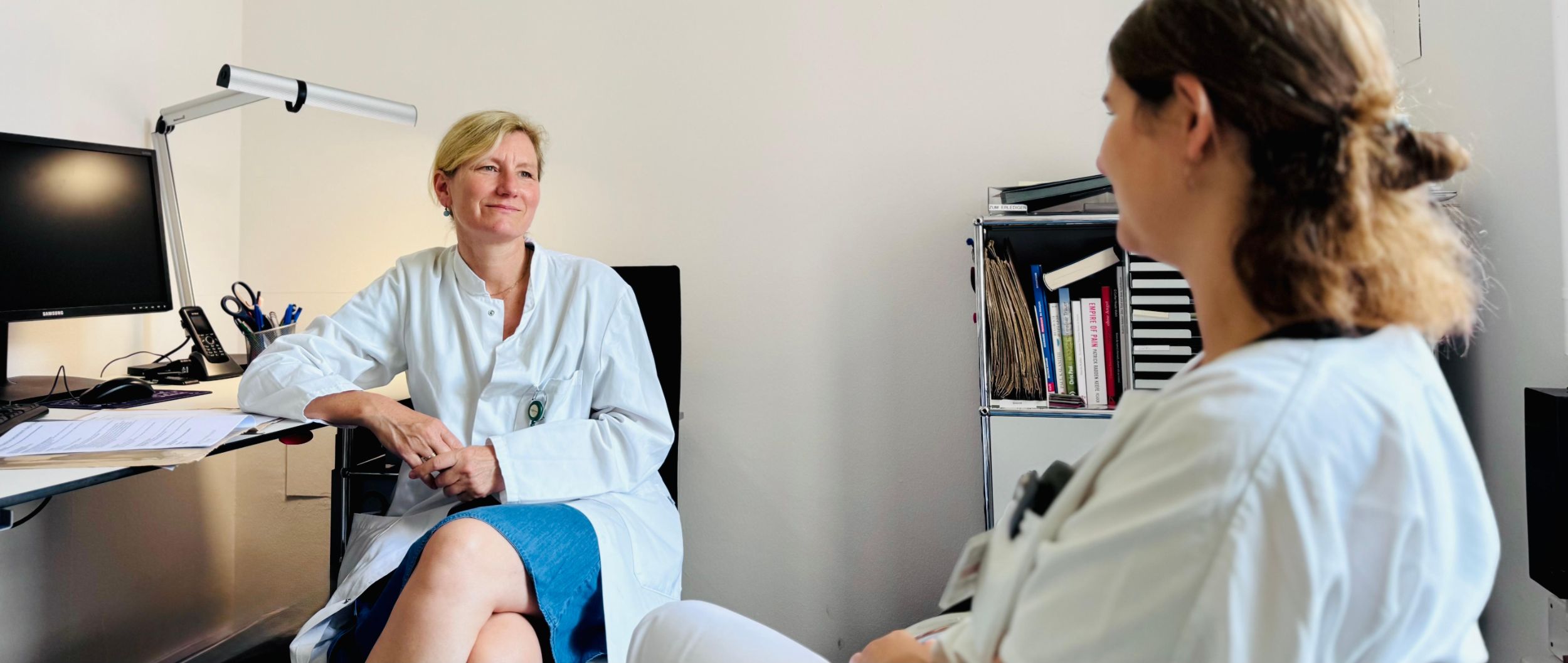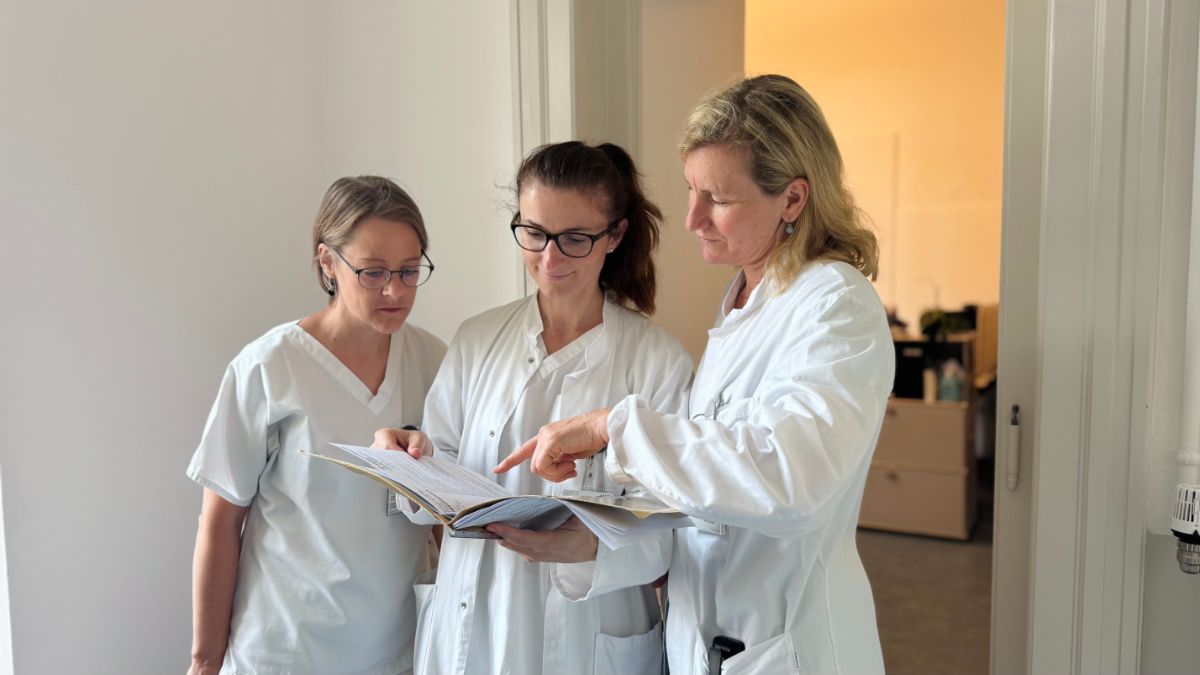
Offer
What palliative care means
"Palliative" is derived from "pallium", the Latin word for cloak, and the English term "care", which means "to tend, care for, protect and look after".
Palliative care can therefore be understood as a kind of cloak that provides protection and security for the patient and their loved ones. The mantle should also provide space for courage and strengthen self-determination and enable the highest possible quality of life in the various phases of the illness.
Based on the definition of the World Health Organization (WHO), palliative care is an approach to improving the quality of life of patients and their environment who are confronted with a life-threatening and/or chronically progressive illness.
What palliative care offers
The focus of palliative care is on the early and comprehensive recognition and best possible treatment of symptoms such as pain, shortness of breath, restlessness, insomnia, digestive disorders, anxiety, depression and despair.
Another important aim is to prevent suffering and complications arising during the course of an illness.
Treatment of the underlying disease, e.g. chemotherapy or radiotherapy, and palliative care are not mutually exclusive, but complement each other.
The needs of people in palliative situations can vary greatly. The aim of palliative care is to find the best possible and appropriate treatment for the individual patient at every stage of the illness.
Unser Angebot am USB
Das Palliative Care Team des USB begleitet stationäre und ambulante Patientinnen und Patienten mit palliativen Bedürfnissen. Unsere Tätigkeit kann von den betreuenden Ärztinnen und Ärzten im Sinne eines Konsils (Beratung durch eine Fachärztin oder Facharzt und einer Pflegefachperson) angefordert werden.
Zum Angebot des Palliative Care-Konsildienstes zählen folgende Aufgaben:
- Erfassung und Linderung von Symptomen wie Schmerzen, Atemnot, Unruhe, Verstopfung und anderen körperlichen Beschwerden
- Beratung zur Therapieziel– und Entscheidungsfindung und gemeinsames Planen des weiteren Therapieweges
- Beratung bei der Erstellung von Patientenverfügungen
- Unterstützung der Patientinnen und Patienten und ihrer Angehörigen bei seelischen oder spirituellen Belastungen
- Unterstützung bei Organisation und Aufbau eines Versorgungsnetzes, in das die Patientin oder der Patient stabilisiert entlassen werden kann
- Begleiten von sterbenden Patientinnen und Patienten sowie Angehörigen im Spital
- Einbindung anderer Fachdisziplinen wie Schmerzdienst, Physiotherapie, Psychoonkologie, Seelsorge, Sozialdienst.
- Kontinuität als Ansprechpartner für Patientinnen und Patienten, Angehörige, Hausarzt und ambulante Dienste
Für Fachpersonen
Umgang mit Wunsch nach assistiertem Suizid
Der Wunsch nach assistiertem Suizid ist ein sehr persönliches und sensibles Thema. Es ist uns wichtig, dass Patientinnen und Patienten, die diesen Weg in Erwägung ziehen, offen über ihre Belastungen und Wünsche sprechen können.
Offer
In einer umfassenden Anamnese ermitteln wir die palliativen Bedürfnisse von Patientinnen und Patienten und ihrem Umfeld. Die Probleme werden priorisiert und ein Behandlungsziel festgehalten. Hierzu machen wir konkrete Vorschläge z.B. zur Medikation oder anderen Massnahmen.
Um den vielschichtigen Bedürfnissen von Patienten in palliativen Situationen gerecht zu werden bedarf es dabei eines ständigen Austauschs des behandelnden Teams. So arbeiten wir eng mit den behandelnden Onkologen und den Kollegen des Schmerzdienstes, der Psychoonkologie, der Psychosomatik, der Physiotherapie, der Seelsorge, der Ernährungsberatung, dem Case Management und der Sozialberatung zusammen.
Die Patientin und den Patienten inklusive Umfeld erachten wir als wichtigen Teil des Teams. Mit Respekt für die Vorstellungen, Wünsche und Werte möchten wir im Dialog die physischen, psychischen, sozialen und spirituellen Bedürfnisse wahrnehmen und diesen begegnen.
Palliative Care unterstützt und begleitet Patientinnen und Patienten und deren Angehörige. Palliative Care bejaht das Leben und erachtet Sterben als einen normalen Prozess. Ziel der Palliative Care ist es, körperliche, soziale, psychologische und auch spirituelle Probleme der Patientinnen und Patienten zu erfassen und diesen zu begegnen. Palliative Care schliesst somit medizinische Behandlungen, pflegerische Interventionen sowie psychologische, soziale und spirituelle Unterstützung mit ein.
Am USB entwickeln wir Palliative Care kontinuierlich weiter, um den Bedürfnissen schwerkranker Patient*innen besser gerecht zu werden. Ein Schwerpunkt unserer Arbeit ist die gesundheitliche Vorausplanung (GVP) – ein Prozess, der Patient*innen hilft, ihre Wünsche zur zukünftigen Versorgung frühzeitig zu klären und festzuhalten.
In unseren Studien erforschen wir Wege, die Würde und den Lebenssinn schwerkranker Patient*innen zu födern und ihr psychisches Wohlbefinden auch in schwierigen Lebensphasen zu stärken.

Ziel unserer Fort- und Weiterbildungen ist die Vermittlung von Fachwissen und die Entwicklung von Handlungs- und Reflexionskompetenz für die Begleitung von Schwerkranken, Sterbenden und deren Angehörigen.

